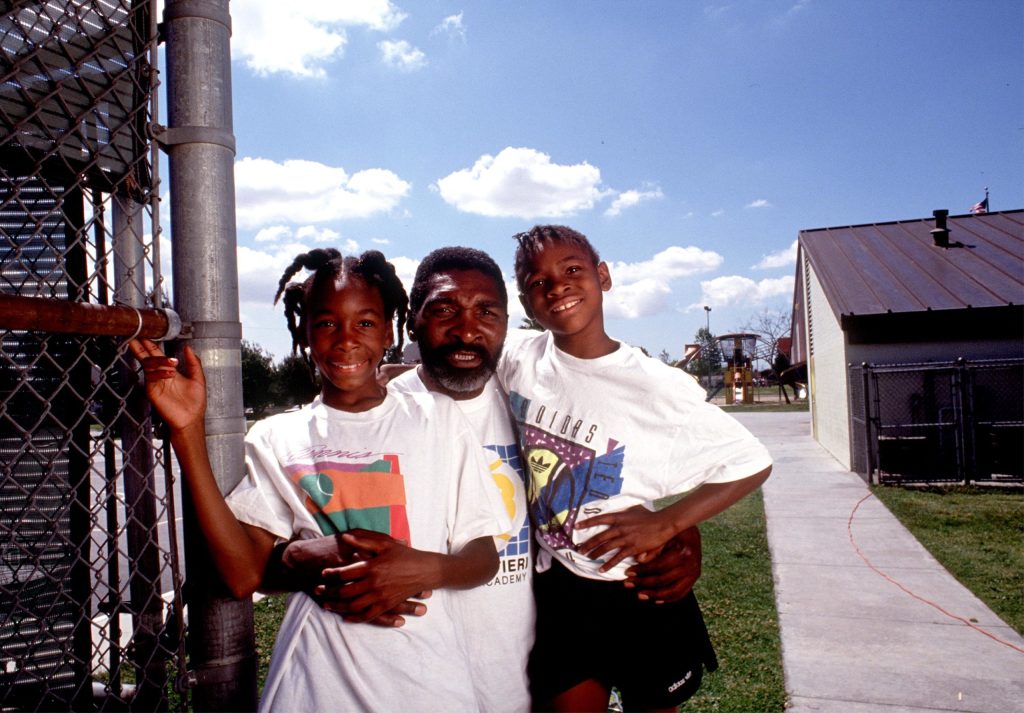King Richard: A portrait of Black parenting in the white world of tennis

King Richard, a sports biopic centered on tennis stars Venus and Serena Williams and their father Richard—a significant shaping influence in their sporting careers—is out in theaters on Friday. The film has received high praise, even from the Williams family, for its accuracy in portraying the early lives of the two sporting icons. Now at the tail-end of their careers, the pair are among the greatest to ever pick up a racquet—and first did so at a time when the sport was still predominantly white.
Set in the early 1990s, King Richard is also a tale of parental striving as much as it is about the dreams of young athletes. The film’s eponymous patriarch, Richard Williams, whom director Reinaldo Marcus Green casts in a favorable light, is famous for having decided that his two Black daughters would be professional tennis players before the pair were even born. Will Smith plays the father; Saniyya Sidney plays Venus, and Demi Singleton plays Serena.
Wendi Williams, dean of the school of education at Mills College, says she hopes the film will generate more conversation around the travails of Black parents in America as they work to support their children in majority white spaces and pursuits, and against the legacies that have denied them equal participation.
Williams is not related to the tennis family. Northeastern announced a merger with the college earlier this year that will establish Mills College at Northeastern University in July 2022.
“We understand the stakes at play for Black parents, period, but also how they are exacerbated when their children are thrust into the limelight,” Williams says. She adds that the film further highlights “the ways in which [Black parents] feel insecure or worried about their children” in ways that are unique to the African American experience.

Photo Courtesy of Wendi Williams, Dean of the School of Education at Mills College
Such concern, for some Black families, can conjure justifiable feelings of over-protectiveness, Williams says. Not only does that come through the film, according to early reviews, but is true of Richard Williams in real-life. In one famous example, when then-14-year-old Venus Williams was asked during a television interview at the approach of her professional career, about why she felt so confident in her tennis ability, her father interrupted and scolded the white journalist for “playing with the image of a … child.”
Williams says the moment underscores the real anxieties Black parents feel in America, which compound when their children are subject to public attention. As a Black girl, Venus “needed all the confidence that she had” to make a name for herself in an all-white space, and her father knew that, she says.
The incident serves an example of how “important it is for girls to have their fathers, and positive male role-models,” Williams says. It also shed light on the ways parents nurture and help “craft healthy experiences of girlhood.”
“His stopping that interview was a defense of her girlhood,” Williams says.
Originally a high-status sport controlled by white men, tennis is still trying to rid itself of the legacies of its elitist beginnings. Today, many of the sport’s biggest names are non-white or mixed race, particularly in the Women’s Tennis Association, like Naomi Osaka, the Williams sisters, and Emma Raducanu. Osaka, born of Haitian and Japanese parents, has been vocal about using her platform to discuss causes she’s passionate about, including the mental health problems experienced by athletes.
In many ways, Venus and Serena were the first women of color to shatter the “rules of comportment” for how tennis players are supposed to look, dress, and behave on court, Williams says.
“Venus and Serena, particularly Serena but also Venus, rejected the kind of respectability politics” that other Black athletes before them adhered to, she says.
Ahead of the film premiere, the Williams sisters, who were consulted throughout its creation, have spoken highly about King Richard.
“The way the story is told is also probably the best way it could be told,” Venus said in an interview recently. “I’m so proud it’s being told this way because it’s the right way.”
For media inquiries, please contact media@northeastern.edu.
